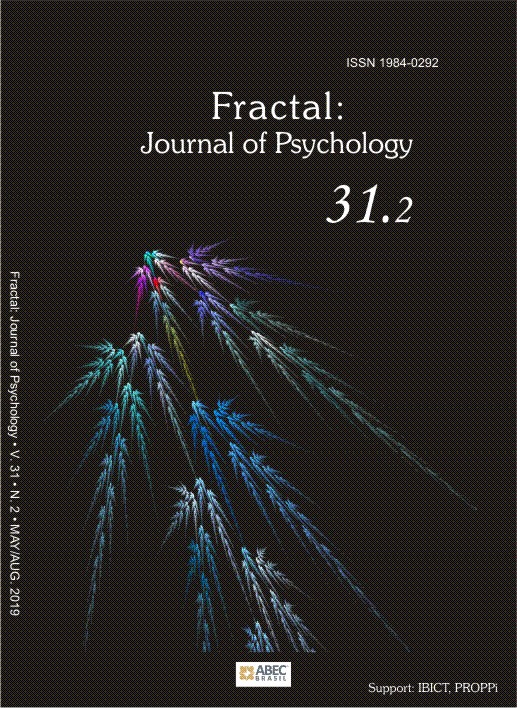My body belongs to me: interfaces between psychology, dance and gender
DOI:
https://doi.org/10.22409/1984-0292/v31i2/5600Keywords:
gender, psychology, body, danceAbstract
This article springs from the introduction of the psychology team in a dance workshop of the Maré Women Reference Center - Carminha Rosa. Through exploration and body recognition provided in the workshop, we percieved the possibility to let go of an identity and open up to new dimensions and possibilities of being. Thus, the article aims to think the interfaces between psychology and dance, reflecting on the posible contributions of these reflections and productions in the area of gender policies. For that we have done semi-structured interviews with workshop participants and analysis of the psychology team reports that followed the workshop. By exploring the body as the anchoring point of psychology and gender equality struggles, the text concludes that the connection between psychology, body and gender represents a promising possibility both in terms of subjective freedom and overcoming forms of domination of gender perspective, and these perspectives deserve further exploration.Downloads
References
ALVES, Branca Moreira; PITANGUY, Jacqueline. O que é feminismo. São Paulo: Brasiliense, 2007.
ALVES, Branca Moreira et al. Espelho de Vênus: identidade social e sexual da mulher. São Paulo: Brasiliense, 1981.
BARROS, Laura Pozzana de. Sistema Rio-Aberto: o corpo em conexão. 2006. Dissertação (Mestrado em Psicologia) – Departamento de Psicologia, Universidade Federal Fluminense, Niterói, 2006
BERTH, Joice. O que é empoderamento? Belo Horizonte: Letramento, 2018.
FLORES-PONS, Gemma.; IÑIGUEZ-RUEDA, Lupicinio. Análisis del discurso tecnocientífico que construye la muerte encefálica en un manual de coordinación de trasplantes. Discurso y Sociedad, Barcelona, v. 3, n. 4, p. 682-713, 2009.
GREGORI, Maria Filomena. Cenas e queixas: um estudo sobre mulheres, relações violentas e a prática feminista. São Paulo: ANPOCS, 1993.
LAZZAROTTO, Gislei Domingas Romanzini; CARVALHO, Julia Dutra de. Afetar. In: FONSECA, Tania Mara Galli; NASCIMENTO, Maria Lívia do; MARASCHIN, Cleci. (Org.). Pesquisar na diferença: um abecedário. Porto Alegre: Sulina, 2012. p. 25-27.
LOURAU, René. René Lourau na Uerj. Análise Institucional e Práticas de Pesquisa. Rio de Janeiro: EDUERJ, 1993.
MARINHO, Paloma Abelin Saldanha. Pedras no caminho? Guardo todas, um dia vou construir um castelo: o processo de empoderamento de mulheres em situação de violência. 2014. Dissertação (Mestrado em Psicologia) – Instituto de Psicologia, Universidade Federal do Rio de Janeiro, Rio de Janeiro. 2014.
MARINHO, Paloma Abelin Saldanha et al. As oficinas sociais e o fortalecimento da autonomia feminina. Brasília: Conselho Federal de Psicologia, 2012. Prêmio Profissional: “Democracia e Cidadania Plena das Mulheres”.
MOEHLECKE, Vilene; FONSECA, Tania Mara Galli. O corpo encontra Apolo e Dionísio: potências e fragilidades. Psicol. USP, São Paulo, v. 19, n. 3, p. 375-392, sept. 2008. http://dx.doi.org/10.1590/S0103-65642008000300007
MOURA, Amanda Duarte. Que corpo é esse? Que pulsa, escuta, expulsa, abraça, comporta, contém: reflexões acerca da inserção de uma psicóloga numa Oficina de Dança. 2015. Monografia (Residência Multidisciplinar em Políticas de Gênero e Direitos Humanos) – Universidade Federal do Rio de Janeiro, Rio de Janeiro. 2015.
SIMONI, Ana Carolina Rios; RICKES, Simone Moschen. Outrar. In: FONSECA, Tania Mara Galli; NASCIMENTO, Maria Lívia do; MARASCHIN, Cleci. Pesquisar na diferença: um abecedário. Porto Alegre: Sulina, 2012. p. 179-181.
SPINDLER, Patrícia. Dança: uma ferramenta potencializadora da subjetividade. Mnemosine, Rio de Janeiro, v. 1, n.1, p. 262-276, 2005.
Downloads
Published
How to Cite
Issue
Section
License
Authors publishing in this journal agree to the following terms:
- Authors retain copyright and grant the journal the right of first publication, with the work simultaneously licensed under the Creative Commons Attribution License allowing sharing of the work with acknowledgement of authorship of the work and initial publication in this journal.
- Authors are permitted to enter into additional contracts separately for non-exclusive distribution of the version of the work published in this journal (e.g., publishing in an institutional repository or as a book chapter), with acknowledgment of authorship and initial publication in this journal.

This work is licensed under a Creative Commons Attribution 4.0 International License.
To the extent possible under the law, Fractal: Journal of Psychology has waived all copyright and related rights to the Reference Lists in research articles. This work is published in: Brazil.
To the extent possible under law,Fractal: Journal of Psychology has waived all copyright and related or neighboring rights to Reference lists in research articles. This work is published from: Brazil.







